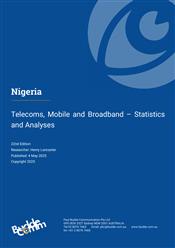Nigeria Telecoms Market Report
Telecoms, Mobile and Broadband - Statistics and Analyses

Last updated: 24 Nov 2023 Update History
Report Status: Current
Report Pages: 267
Analyst: Henry Lancaster
Nigeria’s telcos struggle with poor investment climate
In recent years Nigeria’s telecom sector has benefitted from a range of regulatory measures aimed at improving competition and developing infrastructure. The government’s aim to increase broadband penetration to 70% by the end of 2025 as part of a national broadband plan remains ambitious, given that the penetration rate was below 50% as of August 2023. Broadband services are predominantly delivered via mobile networks, but while there is some investment in fibre infrastructure one promising platform is satellite connectivity. SpaceX launched commercial services in February 2023, providing national coverage with download speeds vastly superior to the national average. Other satellite options also exist, including services provided by the ISP Tizeti based on Eutelsat’s Ka-band connectivity (Konnect), and the NigComSat 2 satellite which delivers 5G backhaul services for MNOs.
The government’s 5G policy has been supported by the award of spectrum. Mafab Communications, Airtel Nigeria, and MTN Nigeria have all launched commercial services, though their reach is limited: MTN Nigeria’s 5G network is the largest though still covered only 7.5% of the population by September 2023.
The sector continues to face economic challenges, notably from unfavourable forex conditions which make the country less attractive to foreign investors, and by the plethora of taxes for telecom services.
Key developments:
- Mafab Communications launches 5G services.
- Tizeti secures NIDF funds to expand its network across 15 states.
- Starlink launches satellite broadband services in Nigeria.
- Nigeria’s broadcasters object to planned reassignment of 600MHz spectrum for telecom use.
- MTN Nigeria drops IHS Holding in preference for ATC as its partner to manage its portfolio of mobile towers.
- More than 500,000 5G users in Nigeria.
- Report update includes the regulator’s market data to August 2023, operator data to Q3 2023, updated Telecom Maturity Index charts and analyses, assessment of the global impact of the pandemic on the telecoms sector, recent market developments.
Companies mentioned in this report:
Nigerian Telecommunications (ntel, Nitel, Pentascope, Transcorp, M-Tel), Africa Mobile Networks, Globacom (Glo Mobile), VGC Communications (MTN Nigeria), Nepskom Communications, MTS First Wireless, Suburban Telecom, Backbone Connectivity Network (BCN), Traffic Network Services, Fibre Tech West Africa, Phase3 Telecom, Alheri Engineering, Mobitel Nigeria, Prestel (O-Mobile), Galaxy Backbone, 21st Century Technologies, Main One (Mainstreet Technologies), Brymedia, NigComSat, O3b Networks, WASACE, Linkserve, Pinet Informatics, Odu’a Telecom, Swift Networks, Startech Connection, Netcom Africa, MWEB Nigeria, Accelon (Internet Solutions), Polestar, Naija Wi-Fi, Suburban Telecom, Zinox, Starcomms, Layer3, Airtel Nigeria (formerly Zain, Celtel), 9Mobile (Etisalat Nigeria, EMTS, Mubadala), Visafone, Starcomms (Capcom), Multi-Links, Reliance, Econet Wireless, Vodacom.
Related Reports
- Africa - Fixed Broadband Market - Statistics and Analyses
- Africa - Mobile Infrastructure and Mobile Broadband
- Africa - Mobile Network Operators and MVNOs
- Ghana - Telecoms, Mobile and Broadband - Statistics and Analyses
- Côte d Ivoire (Ivory Coast) - Telecoms, Mobile and Broadband - Statistics and Analyses
- Algeria - Telecoms, Mobile and Broadband - Statistics and Analyses
- Somalia - Telecoms, Mobile and Broadband - Statistics and Analyses
- Mozambique - Telecoms, Mobile and Broadband - Statistics and Analyses
- Tanzania - Telecoms, Mobile and Broadband - Statistics and Analyses
- Libya - Telecoms, Mobile and Broadband - Statistics and Analyses
Share this Report
TMT Intelligence
A platform to scale your intelligence tasks
Monitor critical insights with our AI-powered Market Intelligence Platform gathering and analyzing intelligence in real time. With AI trained to spot emerging trends and detect new strategic opportunities, our clients use TMT Intelligence to accelerate their growth.
If you want to know more about it, please see:
Research Methodology
BuddeComm's strategic business reports contain a combination of both primary and secondary research statistics, analyses written by our senior analysts supported by a network of experts, industry contacts and researchers from around the world as well as our own scenario forecasts.
For more details, please see:
More than 4,000 customers from 140 countries utilise BuddeComm Research
Are you interested in BuddeComm's Custom Research Service?
Hot Topics
News & Views
Have the latest telecommunications industry news delivered to your inbox by subscribing to BuddeComm's weekly newsletter.